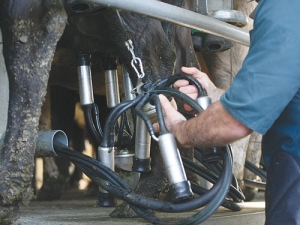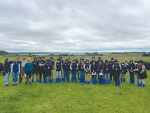"If you invest dollars and a little more time in AI and genetics you will make more money, it is that simple,"
So says Dairy Australia program manager for genetics and data management Matthew Shaffer.
The statistic was revealed in the Australian Dairy Herd Improvement Report 2015 which analysed the productivity of AI bred Holstein and Jersey cows in the national herd of herd recorded cows.
The total number of Jersey cows in this analysis was 55,633 (35,199 AI bred, 20,434 naturally bred) and the number of Holstein cows was 315,574 (219,303 AI bred and 96,271 naturally bred). The average value of the extra annual production for each AI bred Jersey and Holstein cow was $234 and $288 respectively, making a grand total of over $30 million ($5 million for Jerseys, $28 million for Holsteins) of lost production every year for the naturally bred herd recorded cows.
Dairy Australia's Matthew Shaffer and Michelle Axford of the Australian Dairy Herd Improvement Scheme (ADHIS) recommend farmers ensure they have enough replacements sired by AI bulls from the Good Bulls Guide.
"Having the right genetics makes all the difference not only in terms of your cow's health, temperament and milk production outcomes but also the bottom-line profit you can make in your farm business," says Shaffer.
"Don't fall short with your AI program and give it that extra bit of time as the upfront costs will pay dividends for over the lifetime of the cow."
Axford says in 2015, for example, AI bred Australian Holsteins produced 25kg of more fat and 23kg more protein than those naturally bred, creating an additional annual production value of about $288 per cow.
"The figures are a little lower for AI bred Jerseys, but no less impressive and that means if you have 100 more AI bred Holstein or Jersey cows in your herd, you can expect between $23,400 and $28,800 of extra production value every year," she says.
• Source: Dairy Australia.


















